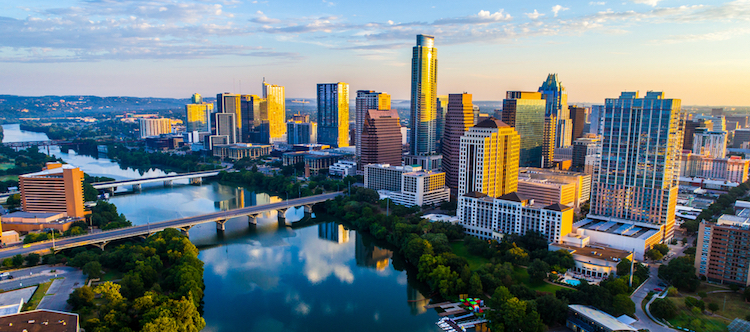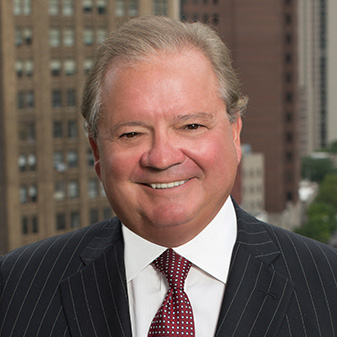The 2020 ABA Midyear Meeting kicks off in Texas

The skyline of Austin, Texas. Image from Shutterstock.com.
The 2020 ABA Midyear Meeting opens in the Lone Star State this week, providing ABA members the opportunity to attend hundreds of legal programs and events; hear from recognized law experts; and meet with colleagues in their sections, divisions, committees and councils.
The annual event, which runs from Wednesday to Monday in Austin, Texas, includes the convening of the ABA Board of Governors to discuss the association’s business matters and the ABA House of Delegates to consider a number of policy proposals.
Weekend selections
In addition to other panel discussions and sessions, the new “Defending Liberty and Pursuing Justice Summit” offers meeting attendees two days of complimentary CLE programming on critical justice issues, including immigration, elder law and domestic and sexual violence.
It begins at 9 a.m. Friday with a keynote address by Austin Mayor Steve Adler on how the legal community can address homelessness and other complex social problems. He will be joined by Judge Ernestine Gray of New Orleans’ Orleans Parish Juvenile Court, who plans to discuss the role the ABA plays in defending liberty and pursuing justice and how her involvement with the association strengthens her resolve to help children and families.
Other Friday programs include “We Don’t Need to Carry the Work Alone: Interdisciplinary Collaborations,” a panel at 10:45 a.m. that presents examples of lawyers adding social workers, medical and mental health professionals, and educators to their legal teams and the lessons learned; and “One Person (N)one Vote: Gerrymandering with the Help of the Disenfranchised,” a panel at 3:15 p.m. that examines residency requirements and moral character tests that prevent students and those who are homeless or have criminal convictions from voting.
The summit continues at 8 a.m. Saturday with “School to Prison Pipeline: From Report to Action,” a program that explores how the legal profession can work on state and local levels to interrupt the school-to-prison pipeline and ensure equity in education and discipline.
The “LGBTQ+ ‘State of the Union’ ” program at 9:45 a.m. includes an analysis of oral arguments in Title VII cases at the U.S. Supreme Court and issues impacting LGBTQ law students. In “Implicit Bias: Governmental Complicity,” one of the final programs at 4:15 p.m., panelists plan to discuss the impact of governmental policies, laws and regulations on housing, transportation and education in communities of color.
Other noteworthy events scheduled for Saturday are the ABA Commission on Racial and Ethnic Diversity in the Profession’s 2020 Spirit of Excellence Awards Luncheon, from noon to 2 p.m.; and the ABA Commission on Sexual Orientation and Gender Identity’s 2020 Stonewall Awards Reception from 5:30 p.m. to 7 p.m.
Follow along with the ABA Journal’s coverage of the 2020 ABA Midyear Meeting here.
Resolutions on Monday
The ABA House of Delegates will consider more than 30 proposed resolutions and amendments during its meeting Monday.
The association’s official policymaking body plans to discuss such significant issues as access to justice, voting rights and gun safety, but the final number of resolutions may change if any are withdrawn or amended, or if more are introduced before the final vote.
Resolution 115 encourages jurisdictions to consider innovative approaches to help more than 80% of people below the poverty line and the majority of middle-income Americans who lack access to civil legal services. According to an ABA news release, at least six states have proposed or adopted regulatory changes to address this problem.
 Image from Shutterstock.com.
Image from Shutterstock.com.
The resolution is co-sponsored by the ABA’s Center for Innovation, the Standing Committee on the Delivery of Legal Services, the Standing Committee on Ethics and Professional Responsibility, the Standing Committee on Professional Regulation, and the Standing Committee on Public Protection in the Provision of Legal Services.
It has sparked some debate among members, with proponents saying changes will lead to more accessible and affordable legal services, and opponents arguing that they could allow nonlawyers to take advantage of vulnerable populations that need legal representation.
Ahead of this year’s presidential election, a trio of resolutions address voting registration and accessibility. Resolution 108 urges governments to allow eligible youth between 16 and 18 to preregister to vote and add them to voter rolls once they reach the legal age. It was submitted by the Standing Committee on Election Law.
Resolution 112, co-sponsored by the Section of Civil Rights and Social Justice and eight other entities, calls on governments to remove barriers to Native American and Alaska Native voter registration and participation, and to establish measures that protect their voting rights. Resolution 114, primarily sponsored by the Coalition on Racial and Ethnic Justice, urges governments to allow individuals to use an address other than a physical residential address—such as a post office box, tribal government building or shelter—for purposes of voter registration.
The Standing Committee on Gun Violence is the primary sponsor of three proposals that will also be considered Monday. Resolution 107A urges governments to regulate “ghost guns,” or guns made by individuals, by applying the same background checks, serialization and record-keeping requirements that apply to traditional firearms.
Resolution 107B urges governments to require people seeking to purchase a firearm to apply for a permit from a designated agency in person, be fingerprinted, and agree to background and criminal records checks, while Resolution 107C calls on governments to define the requirements for safe storage of a firearm, compel firearm owners to meet those requirements, and promote safe storage education for owners.
In response to unjustified shootings of family pets, Resolution 103A, co-sponsored by the Tort Trial and Insurance Practice Section and Criminal Justice Section, urges legislatures and governmental agencies to provide police officers “with comprehensive animal encounter training” on the reasonable use of force to protect officers and the public, reduce legal liability, and ensure that animals are treated humanely.
The Tort Trial and Insurance Practice Section is sponsoring two other proposals related to cannabis. Resolution 103B urges Congress to clarify and mandate that lawyers who provide legal services to clients for marijuana-related activities that comply with state and local laws will not face federal charges.
Resolution 103D additionally calls on Congress to clarify and mandate that banking and financial institutions that provide services to cannabis-related businesses and their attorneys in accordance with state and local laws will not face federal charges.
The House of Delegates’ Committee on Credentials and Admissions also put forth a proposal, Resolution 200, which includes its recommendation approving the California Lawyers Association and North Carolina Bar Association for primary state bar association designation and acquisition of additional delegate seats from other bars in those states.
The full program and additional details can be found on the 2020 ABA Midyear Meeting website.



